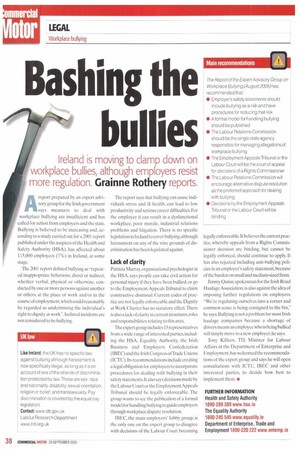Bashing the bullies
Page 40

If you've noticed an error in this article please click here to report it so we can fix it.
Ireland is moving to clamp down on workplace bullies, although employers resist more regulation. Grainne Rothery reports.
Areport prepared by an expert advisory group for the Irish government says measures to deal with workplace bullying are insufficient and has called for action from employers and the state. Bullying is believed to be increasing and, according to a study carried out for a 2001 report published under the auspices of the Health and Safety Authority (HSA), has affected about 115,000 employees (7%) in Ireland, at some stage.
The 2001 report defined bullying as "repeated inappropriate behaviour, direct or indirect, whether verbal, physical or otherwise, conducted by one or more persons against another or others, at the place of work and/or in the course of employment, which could reasonably be regarded as undermining the individual's right to dignity at work-. Isolated incidents are not considered to be bullying. The report says that bullying can cause individuals stress and ill health, can lead to low productivity and serious career difficulties. For the employer it can result in a dysfunctional workplace, poor morale, industrial relations problems and litigation. There is no specific legislation in Ireland to cover bullying, although harassment on any of the nine grounds of discrimination has been legislated against.
Lack of clarity
Patricia Murray, organisational psychologist at the HSA, says people can take civil action for personal injury if they have been bullied, or go to the Employment Appeals Tribunal to claim constructive dismissal. Current codes of practice are not legally enforceable and the Dignity at Work Charter has no statutory effect. There is also a lack of clarity in current structures, roles and responsibilities relating to this area.
The expert group includes 15 representatives from a wide range of interested parties, including the HSA, Equality Authority, the Irish Business and Employers Confederation (IBEC) and the Irish Congress of Trade Unions (ICTU). I ts recommendations include creating a legal obligation for employers to incorporate procedures for dealing with bullying in their safety statements. It also says decisions made by the Labour Court or the Employment Appeals Tribunal should be legally enforceable. The group wants to see the publication of a formal model for handling bullying to guide employers through workplace dispute resolution.
IBEC, the main employers' lobby group, is the only one on the expert group to disagree with decisions of the Labour Court becoming legally enforceable. It believes the current practice, whereby appeals from a Rights Commissioner decision are binding, but cannot be legally enforced, should continue to apply. It has also rejected including anti-bullying policies in an employer's safety statement, because of the burden on small and medium-sized firms.
Jimmy Quinn,spokesman for the Irish Road Haulage Association, is also against the idea of imposing further regulations on employers. "We're regulating ourselves into a corner and common sense is being consigned to the bin," he says. Bullying is not a problem for most Irish haulage companies because a shortage of drivers means an employee who is being bullied will simply move to a new employer, he says.
Tony Killeen, TD, Minister for Labour Affairs at the Department of Enterprise and Employment, has welcomed the recommendations of the expert group and says he will open consultations with ICTU, IBEC and other interested parties, to decide how best to implement them. •






























































































































































































